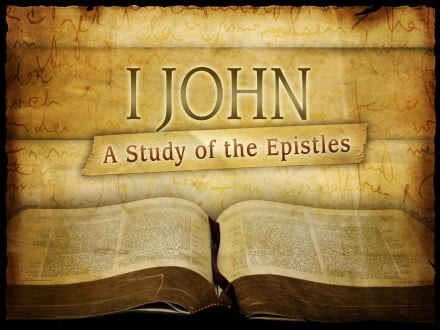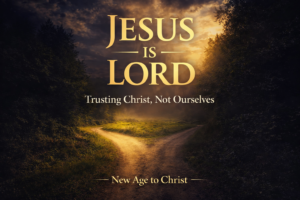⏱️ Estimated Reading Time: 7 min read
In the summer of 1986, I was a hopeless drug addict. I had been strung out since 1979 when I was only twelve-years-old, and I had reached the point where I wanted to commit suicide. Thanks be to God that I didn’t have the courage to follow through on that desire because soon he would bring me to himself.
Early that summer, a drug-addict friend of mine named Brandon gave me a Bible. We were good friends and this was a token of our friendship, but I had no idea what a Bible was or what I should do with it. However, a few months later, another drug-addict friend of mine named Robert told me I should read 1 John. He was not a Christian, but his brother-in-law was and had just encouraged him to read this letter. Robert did so and thought I should, too!
A few days later, out of sheer boredom, I picked up Brandon’s Bible, read 1 John, and by the third chapter I had come to saving faith in Jesus Christ! It was October 26, 1986, and from that day to this, I have been completely sober and, more importantly, I have been walking in fellowship with Jesus and his people. Oh, glory be to his great name for the saving grace that’s so well-articulated in 1 John!
Over the last thirty years, I have read John’s writings many times, and every time I have grown in faith, holiness, and joy. In other words, Jesus used John’s words to save me at a point in time and he has used John’s words to sanctify me over a long period of time. Therefore, my prayer for this series is this: that in reading and meditating on 1-3 John together, we will come to a saving and sanctifying knowledge of Jesus for the glory of his name and the joy of our souls.
Who is Jesus?
John begins his first letter by making three major assertions about Jesus Christ that serve to establish his true identity. John writes, “That which was from the beginning, which we have heard, which we have seen with our eyes, which we looked upon and have touched with our hands, concerning the word of life—the life was made manifest, and we have seen it, and testify to it and proclaim to you the eternal life, which was with the Father and was made manifest to us” (1:1-2).
John’s first assertion is that Jesus “was from the beginning” and is, therefore, eternal. This language clearly echoes the opening words of the Gospel of John where he writes, “In the beginning was the Word, and the Word was with God, and the Word was God. He was in the beginning with God.” With these words, John establishes the true identity, authority, and sovereignty of Jesus. In other words, he asserts that Jesus is God.
Second, John claims in 1 John 1:1 that Jesus took on flesh and blood. Having emphasized the divinity of Jesus, John now quickly adds that he was also a man who could be encountered via normal human senses. Indeed, he insists that the apostles heard Jesus speak, saw him with their eyes, closely observed him over a period of time, and touched him with their hands. In other words, the apostles came to the conviction through teaching and experience that Jesus is fully God and fully man, both things and in that order.
Third, in light of these twin truths, John asserts that Jesus is eternal life. I get this from the fact that John uses the words “life” and “eternal life” in verse 2 as a substitute for the name of Jesus. This implies that Jesus not only gives eternal life to all who believe in him, but that he is the eternal life he gives. As Jesus himself said in John 17:3, “And this is eternal life, that they know you the only true God, and Jesus Christ whom you have sent.” So eternal life is not so much about how long a person lives as it is about knowing Jesus Christ and being in fellowship with him. To be in fellowship with Jesus is to have life because he is life.
And John says that this is the heart of the message that the apostles both testified to and proclaimed through their ministries. That is, the apostles’ passion was to proclaim to the world that Jesus enjoys a perfect and eternal fellowship with God, that he also humbled himself and became a man, and that he is, therefore, eternal life for all who believe in him. Indeed, the key to understanding reality in the mind of John is comprehending, or at least glimpsing, the depth and intensity of the love between God the Father and God the Son, a love that overflowed into the world so that hopeless sinners like me might have life in him.
The Purpose of the Apostles’ Ministry
With this in mind, John goes on in verses 3-4 to state the purpose of both the apostolic ministry and his first letter. John writes, “that which we have seen and heard we proclaim also to you, so that you too may have fellowship with us; and indeed our fellowship is with the Father and with his Son Jesus Christ. And we are writing these things so that our joy may be complete.” The reason the apostles were so passionate about proclaiming Christ to the world was because, through him, all who believe enter into the fellowship of the Father, the Son, and those who walked and talked with him. The Greek word for “fellowship” here means “a commonness of life,” and so John is saying that the aim of the apostles’ ministry was to invite others into commonness of life in Christ.
If John would have stopped writing after the words “so that you too may have fellowship with us,” then the fellowship to which he referred would really be no different from other forms of human fellowship. It would have been an invitation into a sort of social or religious club. But, praise be to God, John didn’t stop writing and instead made the claim that their fellowship was with God the Father and his Son Jesus Christ. In other words, by the grace of God and belief in Jesus, the apostles were granted enter into the fellowship Jesus shared with the Father. And then, through their preaching, all who believed in Jesus were also granted entrance into this fellowship.
Beloved, please meditate on this truth: to be a follower of Jesus Christ is to enter into the mutual delight of the Father and the Son, a fact which elevates the issue of fellowship from simple human interaction to something beyond what we can imagine.
Because this is so, John was compelled to say in verse 4 that he wrote his first letter to persuade his readers to enter into the high joy of this fellowship. His desire is to dissuade us from error, to persuade into the fellowship of the Father and Son, and to thus increase our joy to the highest level. Indeed, the word he uses for “complete” here means “to be filled to the brim,” and so John writes that our joy will reach its maximum potential in Jesus.
Therefore, we can say that the overarching claim of John’s letter is this: Jesus Christ is eternal life and fullness of joy is found in fellowship with him. Jesus doesn’t give us eternal life, he is eternal life, and the way to be deeply and eternally happy is to be united with him by grace through faith. The rest of John’s letter is designed to show us how to be thus united, and I pray that we will have ears to hear and hearts to receive all that he has to say. May Jesus lead us into a greater fullness of joy this November!




